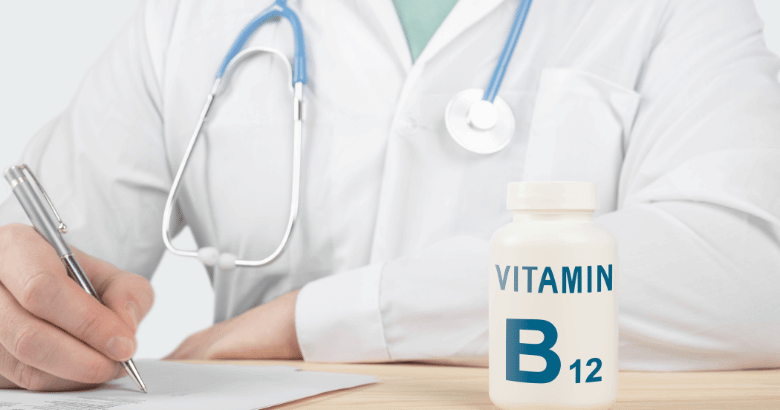Vitamin B12 is often hailed as a powerhouse nutrient essential for maintaining health and vitality. We’ve all heard about its importance, but have you ever wondered what happens when we get too much of this vital vitamin? I’ll explain why vitamin B12 overdose effects can be so dangerous in this article. Understanding the risks is crucial, mainly as more people use supplements to meet their nutritional needs.
Vitamin B12 Overdose Effects
In the vast realm of essential vitamins, vitamin B12 often operates in the shadows, overshadowed by its more famous counterparts like vitamin C or vitamin D. Despite its less prominent status, vitamin B12 quietly but significantly influences our overall health. Here, we’ll shine a spotlight on the underappreciated role of vitamin B12 and why it merits a closer examination.
The Unsung Importance of Vitamin B12
- An Essential Player: While it may not boast the same level of notoriety as vitamin C’s immune-boosting powers or vitamin D’s role in bone health, vitamin B12 is undeniably essential. It functions as a coenzyme, facilitating crucial biochemical reactions within our bodies. These reactions are pivotal for processes like DNA synthesis, cellular energy production, and the formation of red blood cells.
- Nerve Health: Vitamin B12’s role in maintaining a healthy nervous system cannot be overstated. It is integral to the creation of myelin, a protective sheath that surrounds nerve fibers. This sheath ensures efficient transmission of nerve impulses. In simpler terms, vitamin B12 helps ensure your nerves communicate effectively.
- Cellular Integrity: At the cellular level, vitamin B12 is instrumental in upholding the integrity of your genetic code. It is crucial in synthesizing DNA, the genetic material responsible for cell growth, repair, and overall vitality. Without adequate vitamin B12, our cellular machinery can falter.
- Energy and Red Blood Cells: Think of vitamin B12 as your body’s energy booster and blood strengthener. It helps turn the food you eat into the energy your body needs. It’s like the fuel for your cells’ engines, called mitochondria, keeping them running smoothly. Vitamin B12 also plays a big part in making strong red blood cells, which carry oxygen to every part of your body. It does this by helping to create a unique protein called hemoglobin, like a superhero carrying oxygen in your blood. When you have enough vitamin B12, you stay energetic and prevent feeling tired all the time. So, even though it’s not as famous as some other vitamins, it’s still a big hero for your body’s health. Keeping it in the right balance is essential, so you don’t risk too much, which can lead to health problems.

Dietary Sources of Vitamin B12
While we often think of meat as the primary source of vitamin B12, it’s not the only option. This nutrient can be found in various foods, which is essential for individuals following vegetarian or vegan diets:
- Animal Products: The most abundant sources of vitamin B12 come from animal-derived foods. These include beef, poultry, fish, and dairy products like milk, cheese, and eggs.
- Fortified Foods: To accommodate the dietary needs of vegetarians and vegans, many food products, such as plant-based milk alternatives and breakfast cereals, are fortified with vitamin B12.
- Supplements: In cases where dietary sources are limited, or absorption is compromised, supplements are available in various forms, including capsules, tablets, and even sublingual (under-the-tongue) options.
Vitamin B12 Overdose Effects: Vitamin B12 Recommended Daily Intake
Let’s discuss how much vitamin B12 your body needs to stay healthy. It’s like figuring out how many miles you must drive to reach your favorite vacation spot. Here’s the scoop:
Recommended Daily Amount: For most adults, the right amount of vitamin B12 daily is around 2.4 micrograms. Think of it as your daily fuel for staying healthy and active.
Not One Size Fits All: But here’s the thing – your needs might be different from your friend’s or your mom’s. It depends on your age if you’re a guy or a gal, and what stage of life you’re in. For instance, pregnant and breastfeeding women often need more vitamin B12 to meet their body’s extra demands.
How Much Vitamin B12 Do You Need?
Age Group and Life Stage | Recommended Vitamin B12 Intake (micrograms) |
Infants (0-6 months) | 0.4 (adequate intake) |
Infants (7-12 months) | 0.5 (adequate intake) |
Children (1-3 years) | 0.9 |
Children (4-8 years) | 1.2 |
Children (9-13 years) | 1.8 |
Teens (14-18 years) | 2.4 |
dults (19-50 years) | 2.4 |
Pregnant Adults (19-50 | 2.6 |
Breastfeeding Adults (19-50 | 2.8 |
Adults (51 years and older) | 2.4 |
So, even though vitamin B12 doesn’t always steal the spotlight, it’s a backstage hero for your health. Understanding how much you need is the first step in making sure you get the right amount – not too little and definitely not too much. It’s like finding the perfect balance for a smooth journey toward a healthy life, and that’s what we’ll explore next when we talk about the risks of having too much of this essential nutrient.
The Importance of Vitamin B12 for Our Health
Let’s think of vitamin B12 as your body’s health superhero, quietly working behind the scenes to keep you in tip-top shape. It’s like the unsung hero in your favorite story, and here’s why:
Imagine your body is a bustling city, and vitamin B12 is the traffic cop, directing all the important activities. It helps your nerves talk to each other, like a telephone line connecting different parts of the city. Without vitamin B12, your nerves might get all tangled up, causing strange feelings like tingling or numbness.
Now, picture your body as a construction site, with many workers always building new buildings. Vitamin B12 is like the foreman, ensuring everyone has the right tools and blueprints. It’s crucial for creating strong, healthy cells and ensuring everything runs smoothly.
But here’s the real magic: vitamin B12 is your energy booster. It’s like the fuel that powers your body’s engines, so you can do everything you love, like playing with friends or running outside. Plus, it helps your blood stay strong and carry oxygen everywhere it’s needed, just like a superhero saving the day.
So, even though vitamin B12 doesn’t always steal the spotlight, it’s a big deal for your health. It’s like having a trusty sidekick, quietly working to keep you feeling your best. That’s why it’s essential to ensure you have the right amount – not too little and definitely not too much – to keep your health superhero happy and your body in great shape!
Why Vitamin B12 Overdose Can Be Harmful: Let’s Explore
Now that we’ve acknowledged the possibility of a vitamin B12 overdose and what can contribute to it, let’s take a closer look at why this situation can be concerning for your well-being. Although the idea of more vitamins may seem like a good thing, the reality of excessive vitamin B12 intake can be alarming and potentially life-altering.
Vitamin B12 Overdose Effects: The Impact on Your Nervous System
One of the most problematic aspects of a vitamin B12 overdose is its potential to disrupt the harmony within your nervous system. Here’s why this matters:
- Nerve Damage: Vitamin B12 plays a critical role in safeguarding the health of your nerves. An overdose can upset this delicate balance, leading to nerve damage. This can manifest as symptoms such as tingling sensations, numbness, and muscle weakness. In severe cases, this nerve damage may become permanent.
- Neuropathy: A vitamin B12 overdose can progress to a condition known as neuropathy. This condition involves persistent and often excruciating nerve pain, significantly impacting your quality of life. It can affect your ability to walk, use your hands, and perform everyday tasks, transforming your life in unexpected and challenging ways.

Cardiovascular Complications
Elevated doses of vitamin B12 can also pose risks to your cardiovascular system, potentially having dire consequences:
- Hypertension (High Blood Pressure): Vitamin B12 overdose has been connected to higher blood pressure levels. Think of it like turning up the heat in a pot of water—it can start boiling and bubbling. In your body, high blood pressure isn’t a good sign. It’s a vital risk factor for heart disease, strokes, and other heart problems. Keeping your blood pressure in the acceptable range is crucial for overall well-being. However, excessive vitamin B12 can sometimes throw this balance off-kilter. So, while vitamin B12 is important, it’s equally essential to keep it in check to avoid these potential blood pressure issues.
- Blood Clot Formation: Another cardiovascular concern linked to vitamin B12 overdose is an elevated risk of blood clot formation. These clots can obstruct blood flow to vital organs, potentially leading to life-threatening conditions such as heart attacks or strokes.
Gastrointestinal Discomfort
Excessive vitamin B12 intake can also have repercussions for your digestive system, causing discomfort and inconvenience:
- Nausea and Vomiting: Overdosing on vitamin B12 may trigger nausea and vomiting. These symptoms affect your physical comfort and can lead to dehydration and nutritional imbalances if left unattended.
- Digestive Disruption: An overdose can upset the balance of beneficial gut bacteria, potentially leading to digestive discomfort and irregular bowel movements. A well-balanced gut is vital for overall health, and an imbalance can ripple effect on your well-being.
Other Potential Health Risks
In some instances, a vitamin B12 overdose can extend its impact to broader health aspects:
- Allergic Reactions: Sometimes, when people take too much vitamin B12, it can trigger allergic reactions. These reactions can be as mild as a skin rash, like a small bump in the road. But for some folks, it can escalate to something much more severe, like anaphylactic shock, like a sudden thunderstorm on a calm day. This surprising connection reminds us that even the nutrients we need can have unwanted effects when we have too much. It’s like enjoying your favorite treat but having too much of it, causing an unexpected twist in your health story. So, balance is vital, even with essential nutrients like vitamin B12.
- Interference with Other Nutrients: Vitamin B12 overdose can disrupt the absorption of other essential nutrients, including folate. This interference can create a chain reaction of health issues, potentially affecting various bodily functions.
Understanding these potential health risks underscores the importance of being responsible regarding vitamin B12 supplementation and dietary choices. In the next section, we’ll explore how to prevent a vitamin B12 overdose and the appropriate steps to take if you suspect that an overdose may have occurred. Your health is valuable, and knowledge empowers you to safeguard it wisely.
Staying Healthy with Vitamin B12: What to Do
Now that we’ve explored the world of vitamin B12 and its possible challenges let’s focus on the practical side of things – how to make sure your vitamin B12 levels are just right and what to do if they’re not. Think of it as having a helpful guide for a healthy and balanced life:
Avoiding Too Much:
- Make smart choices to avoid getting too much vitamin B12.
- Stick to the recommended daily amount based on your age and stage in life.
- If you’re considering taking extra vitamins, talk to a healthcare person, especially if you have special dietary needs or health issues.
Eating Well: Eating a balanced diet is your friend regarding vitamin B12. Include lean meats, fresh fish, eggs, and healthy dairy products in your meals. Consider fortified cereals and plant-based milk alternatives if you’re a vegetarian or vegan.
Regular Health Check-Ups: Getting regular health check-ups is like giving your body a tune-up. Talk to your personal healthcare provider if you’re worried about your vitamin B12 levels. They can do simple blood tests to check your vitamin B12 levels and give you advice tailored to you.
Be Careful with Supplements: If your healthcare provider says you need vitamin B12 supplements, follow their advice closely. Supplements you can buy without a prescription can be of different strengths, so pick the right one for your needs.
Deficiency is Fixable: If you’re told you have a vitamin B12 deficiency, don’t worry – it’s treatable. Your healthcare provider might suggest changes to your diet, vitamin pills, or even vitamin B12 shots, depending on its seriousness.
Vitamin B12 Overdose Effects: Conclusion
So, there you have it – the ins and outs of vitamin B12, its importance, and how to keep it in balance. Think of vitamin B12 as your trusty sidekick in the adventure of a healthy life.
By making intelligent choices about your diet, staying in touch with your healthcare provider, and avoiding the pitfalls of vitamin B12 overdose effects, you’re well on your way to maintaining a happy and healthy balance in your life. Remember, when it comes to your well-being, knowledge is your superpower. Keep it balanced like your vitamin B12, and your health will thank you.




